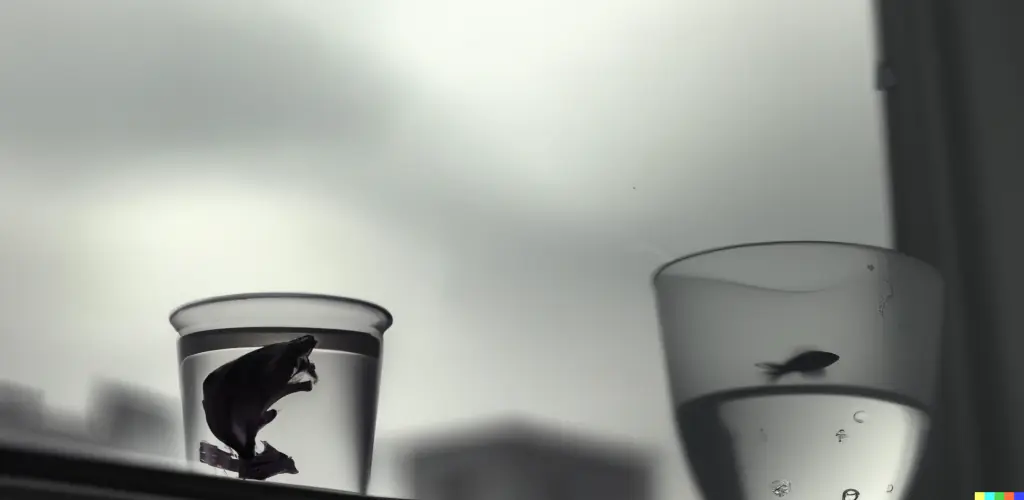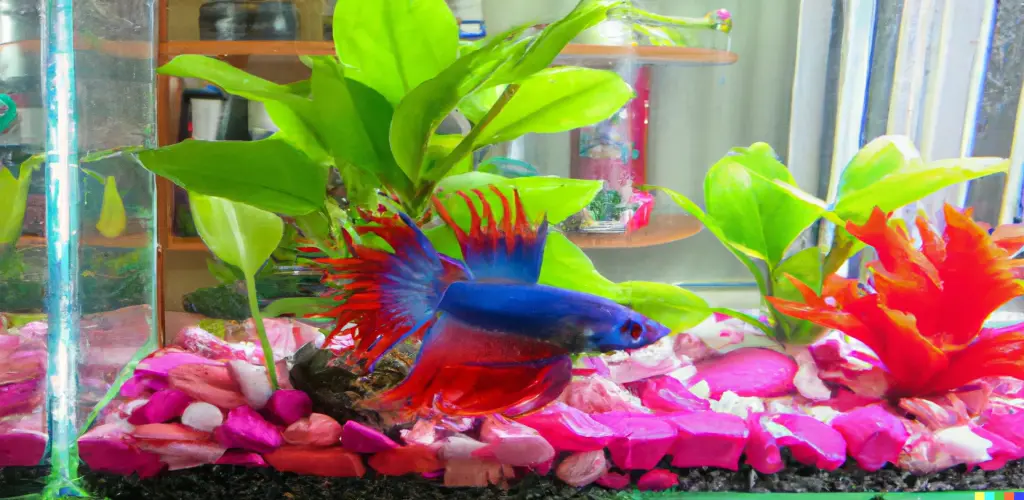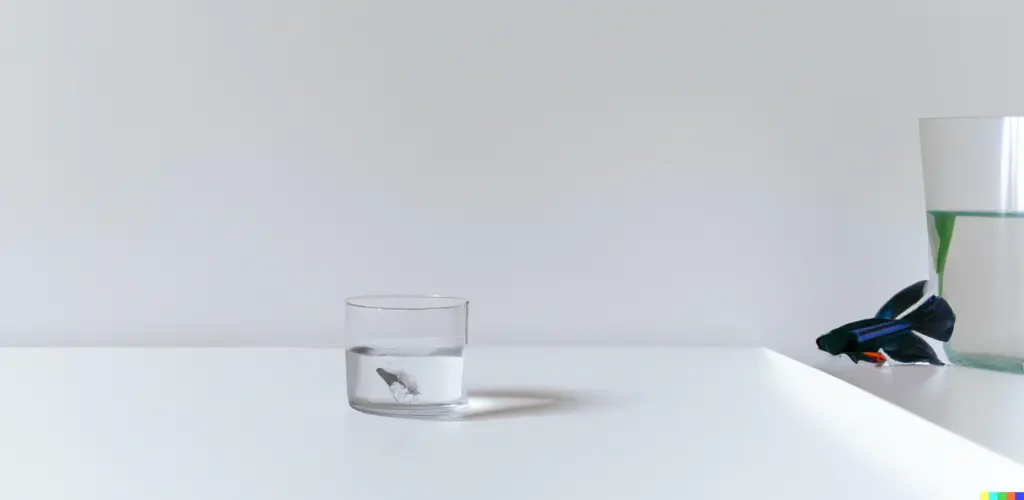Betta fish, known as Siamese fighting fish, is popular among fish lovers because of their bright colors and unique personalities. However, they are often sold in small cups or containers in pet stores, leading to questions about their lifespan in confined spaces. In this article, we will discuss how long can a Betta fish live in a cup and the factors that can affect its lifespan.
How Long Can a Betta Fish Live in a Cup
The Average Lifespan of Betta Fish
Generally, Betta fish have an average lifespan of two to five years, but this can be impacted by various factors, including the size of their living space and the quality of the water they are kept in. Betta fish require space to swim and explore, and a larger living space can help to promote their physical and mental health. Maintaining good water quality, including filtration and regular water changes, is also essential to ensure the longevity of Betta fish.
The Impact of a Small Space on Lifespan
The impact of a small space on the lifespan of Betta fish cannot be understated. When kept in a small cup or container, their movement is often restricted, leading to a lack of exercise and negative effects on their overall well-being. Furthermore, the limited space can also increase the risk of physical injury and reduce their ability to establish territories or engage in other natural behaviors. All these factors combined can ultimately shorten their lifespan.
The Importance of Quality Water
Another critical factor affecting the lifespan of Betta fish is the quality of the water they are kept in. Water quality can be challenging to maintain in small cups or containers, and it can quickly become polluted with fish waste and uneaten food.
This can lead to high levels of harmful toxins in the water, weakening their immune system and making them more susceptible to illness and disease. Moreover, Betta fish require a consistent temperature of 78-80°F, and the small size of the cup or container can make it challenging to maintain a stable environment.
Negative Effects of Keeping a Betta Fish in a Cup

Keeping a Betta fish in a cup or a small container can negatively affect their overall health and well-being. These negative effects can manifest in various ways, including stunted growth, behavioral changes, and health problems.
Stunted Growth
One of the most noticeable adverse effects of keeping a Betta fish in a cup is the stunted growth of the fish. A small cup or container can restrict the fish’s movement, leading to physical underdevelopment and reduced muscle mass. Furthermore, the limited space can limit the fish’s ability to exercise, contributing to poor muscle tone and decreased overall fitness.
Behavioral Changes
Betta fish are known for their unique personalities and active behavior, but when kept in a small cup, they may exhibit behavioral changes. The restricted space can lead to stress and boredom, resulting in lethargy, decreased activity levels, and a lack of engagement with their surroundings. Furthermore, the limited space can also cause aggression and territorial behaviors, as the fish may perceive intruders as threatening their limited space.
Health Problems
Keeping a Betta fish in a cup can also result in various health problems. The limited space can lead to fish waste and uneaten food accumulation, creating high levels of harmful toxins in the water. Furthermore, the small size of the cup or container can make it challenging to maintain a stable water temperature and good water quality, leading to an increased risk of disease and illness.
Lastly, stress can significantly impact the lifespan of Betta fish in cups or containers. Betta fish are known for their aggressive nature, and they require ample space and hiding places to establish their territory and reduce stress. They may become stressed in a small cup or container due to the lack of hiding places or exposure to other Betta fish. Stress can weaken their immune system and make them more susceptible to illness and disease.
Tips for Keeping Your Betta Fish Healthy and Happy

If you want to keep your Betta fish healthy and happy, there are several things you can do to provide them with the best possible environment.
Choosing the Right Size Aquarium
The first step is to choose the right size aquarium for your Betta fish. A larger aquarium provides more space for your fish to swim and exercise, which is essential for their physical and mental health. A good rule of thumb is to have at least a 5-gallon tank for a single Betta fish.
Providing a Suitable Filter and Heater
It’s essential to provide a suitable filter and heater to maintain a stable and healthy environment for your Betta fish. A filter helps to keep the water clean and free from harmful toxins, while a heater maintains a consistent temperature of 78-80°F, which is necessary for their well-being.
Maintaining Water Quality
Maintaining water quality is also crucial for the health of your Betta fish. Regular water changes and a water conditioner can help keep the water clean and free from harmful toxins. You should also regularly test the water to ensure the pH, ammonia, and nitrate levels are within the appropriate range.
Feeding Your Betta Fish Properly
Feeding your Betta fish a balanced and appropriate diet is essential for their health. A high-quality pellet or flake food, supplemented with occasional treats like frozen or live foods, can provide them with the necessary nutrients.
Providing Enrichment and Stimulation
Finally, providing enrichment and stimulation for your Betta fish can help keep them happy and healthy. Adding plants, rocks, and hiding spots can give them a sense of security and stimulate their natural behavior. Additionally, rotating toys, adding a mirror for them to flare at, and varying their feeding routine can provide mental stimulation and prevent boredom.
Conclusion
In summary, a Betta fish can survive in a cup or container. Still, their lifespan will likely be shorter than if they were kept in a larger tank with proper filtration, water quality, temperature, and nutrition. Providing Betta fish with a minimum of 2.5 gallons of water, a consistent water temperature, and a balanced diet is vital. Providing hiding places and minimizing stress can also improve their quality of life and increase their lifespan. Ultimately, if you are considering getting a Betta fish, it is essential to prioritize its well-being by providing them with a suitable environment to thrive.
Frequently Asked Questions About Betta Fish in Cups
What Size Tank Do Betta Fish Need?
Betta fish require a tank of at least 5 gallons in size to thrive. While they can survive in smaller tanks, this can lead to stunted growth, stress, and health problems.
How Often Should I Clean My Betta Fish’s Tank?
It’s essential to maintain a clean and healthy environment for your Betta fish. You should perform a partial water change of around 25% every week and clean the tank once a month.
Can I Keep More Than One Betta Fish Together?
Betta fish are territorial and aggressive towards other Betta fish, especially males. Keeping more than one Betta fish together in the same tank is not recommended.
What Should I Do If My Betta Fish Gets Sick?
If you notice any signs of illness in your Betta fish, such as lethargy, loss of appetite, or discolored fins, you should isolate the fish and seek veterinary care. Diagnosing and treating the illness as soon as possible is essential to ensure the best chance of recovery.
Can Betta Fish Live with Other Types of Fish?
Betta fish can live with other types of fish, but you must take careful consideration. Betta fish are known to be aggressive toward other fish, especially those with similar colors or fin patterns. It’s important to research and carefully select suitable tank mates for Betta fish to ensure they can coexist peacefully.





Pingback: Betta Fish Folded In Half: Causes And Prevention - Betta Fish Advice
Pingback: Why Is My Betta Fish Tank Slimy: Answered - Betta Fish Advice
Pingback: How To Treat Swim Bladder In Betta Fish? Complete Guide 2023 - Betta Fish Advice